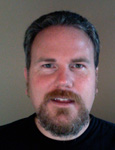They were very handy books, published by Dent. They fit into my pocket. On the left was the Italian text, and on the right a literal translation. I devised this modus operandi: I first read a verse, a tercet, in the English prose; then I read the verse in Italian; and so on through to the end of the canto. Then I read the whole canto in English, and finally in Italian. With that first reading I realized that the translations were no substitute for the original text. The translation could be, at best, a means and a stimulus for the reader to approach the original. ... Poetry is, among so many other things, an intonation, an accentuation that is often untranslatable.
I was recently reminded of this because I decided that my digital history grad class should use the Processing programming language for their group project. Since I haven't programmed in the language before, I bought a couple of textbooks and sat down to read them, slowing when I needed to mentally translate unfamiliar commands into more familiar idioms.
Beginning programmers often worry about which language to learn first. Which one is the most powerful? The most useful? The easiest to learn? Which one will help me to get a high paying job? The investment of a semester or a year seems like a long time to study something when it might turn out to be the wrong choice. At a theoretical level, programming languages are deeply equivalent, but that is more a matter of theory than practice... because every programming language makes some things easy and some things hard. Or in the slogan of one language, "makes easy things easy and hard things possible." These language differences become the stuff of holy wars, but they shouldn't. The best language for the job depends largely on the job.
Processing, for instance, has built-in commands that make it easy to map numbers from one range of values to another. Now this isn't something that is too difficult to program from more primitive commands; it comes up frequently enough that you learn how to do it in whatever language you're using. But when I read the description of the Processing commands, I realized that I have implemented similar functions in almost every language that I've ever programmed in. By choosing to make this a language primitive, the designers of Processing made it easier for beginners to do a number of different tasks, including scaling the ranges of values returned by different analog sensors (which is something my students will need to do).
There's no one true language for programming any more than there is one true language for humanism, or one true wood for carpenters. As Borges says, the intonations of poetry are often untranslatable, and it's true for code, too. In a sense, you don't really know how to program until you're familiar with more than one language, because the essence of programming consists in knowing how to translate the idioms of one language into a more or less familiar one. And this is something that humanists have long known: if there is a oneness and truth to language, it is to be found in the multiple practices of translation.
Tags: programming
